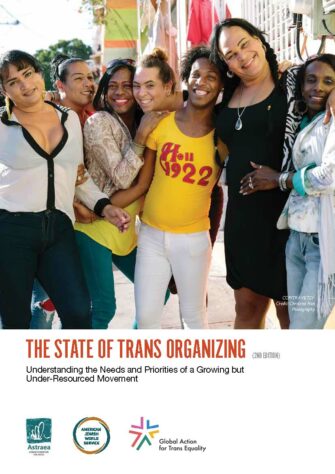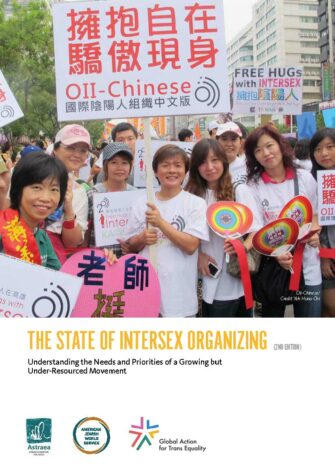NEW YORK, NY – Today, American Jewish World Service (AJWS), Astraea Lesbian Foundation for Justice (Astraea) and Global Action for Trans Equality (GATE) released the findings of their global surveys of intersex and trans organizations in 107 countries engaged in advocacy, services and education in two new reports, The State of Intersex Organizing and The State of Trans Organizing. More than 450 groups working on trans issues and more than 50 groups working on intersex issues participated in the surveys. The surveys looked at the financial and organizational capacity of intersex and trans groups around the world, which provide critical support and services to their respective communities, including legal aid, health care, advocacy and leadership training.
The reports conclude that, despite increased awareness and media coverage of both intersex and trans people and issues, intersex and trans groups are deeply under-resourced and continue to be neglected by international funders. Global funding for broad LGBTI groups has grown exponentially in recent years, but just 6% of trans groups and almost no intersex groups receive funding from donor governments.
Foundations are the primary source of external funding for these groups, but the need far outweighs the current level of support, with more than three-fifths of trans groups and almost half of intersex groups not receiving funding. Of those who applied and did not receive funding, more than half of intersex groups and more than a third of trans groups were told by funders that funding for their issues was not a priority. As a result, more than half of trans groups and more than three-quarters of intersex groups globally had 2016 budgets of less than US $10,000. Only just over 1 in 5 trans groups and 1 in 10 intersex groups had 2016 budgets over US $50,000.
“The hundreds of trans and intersex groups we surveyed are sending a strong message to funders about their needs,” said Mauro Cabral Grinspan, Executive Director of GATE. “In all corners of the world, trans and intersex groups face tremendous challenges, including discrimination and violence, and desperately need additional resources from governments and foundations to continue – and expand – their vital work.”
The longstanding underfunding of intersex and trans groups is reflected in chronic understaffing of these organizations. Fewer than 1 in 5 intersex groups and 1 in 3 trans groups have full-time paid staff. Even those with paid staff struggle to provide a living wage given their budget constraints.
Intersex and trans groups overwhelmingly report having pressing, unmet needs which undermine the sustainability of their efforts. Nearly 8 in 10 trans and intersex groups report needing support with fundraising and grant-writing, and roughly three-quarters report needing support in healing from trauma and preventing burnout for trans and intersex activists who are leading the fight against significant human rights violations.
“The funding gap for trans and intersex groups is an outrage that has real-world impacts on people’s lives. We call on donors to increase their support and to ensure that funding decisions are driven by the needs of activists,” said Sarah Gunther, Director of Philanthropic Partnerships for Astraea. “The International Trans Fund and Intersex Human Rights Fund are two new activist funds that are modeling how this can be done, with strong participation and decision-making by trans and intersex activists themselves. Activists who are closest to the problems that need solving know best which interventions are most effective.”
“Intersex and trans activists are fighting violence and discrimination while pioneering new legal reforms and shifting cultural narratives across every region of the world,” said David Scamell, Director of International Advocacy for AJWS. “We believe that international funders must step up so that intersex and trans activists will receive the resources and support they need, so that they can continue to build global momentum for positive change for trans and intersex people.”
The reports on the state of intersex and trans organizing will be released on October 31 in conjunction with the ILGA-Europe 2017 Annual Conference in Warsaw, Poland. These reports are available on the web: The State of Intersex Organizing and The State of Trans Organizing.
# # # # #
About Astraea Lesbian Foundation for Justice (Astraea)
Astraea is the only philanthropic organization working exclusively to advance LGBTQI human rights on a global scale. Through grantmaking, capacity building and leadership development, philanthropic advocacy and media and communications, Astraea provides critical strategic resources to hundreds of LGBTQI groups in the U.S. and internationally.
http://www.astraeafoundation.org/
About American Jewish World Service (AJWS)
American Jewish World Service is the leading Jewish organization working to promote human rights and end poverty in the developing world. Through direct funding of trans and intersex groups and carrying out advocacy to increase funding by other funders, AJWS works to increase resources for LGBTI communities in the developing world, including intersex and trans activists.
About Global Action for Trans Equality (GATE)
GATE is an international organization working on gender identity, sex characteristics and, more broadly, on bodily diversity issues. We work on supporting trans, gender diverse and intersex movements by producing and making available critical knowledge, promoting their access to organizational resources, and advocating with them to make our human rights a lived reality.
Intersex: Intersex people are born with sex characteristics (including genitals, gonads and/or chromosome patterns) that vary from typical binary notions of male or female bodies. Intersex is an umbrella term used to describe a wide range of natural bodily variations.
Trans/transgender: People whose gender identity or expression differs from the sex assigned to them at birth. Some trans people identify and present themselves as either a man or a woman; others identify with a gender nonconforming or a nonbinary gender category. Trans people identify themselves by many different terms, some of which are specific to local cultures, including transgender, transsexual, fa’afafine, travesti, hijra, genderqueer or transpinoy—to name just a few.







